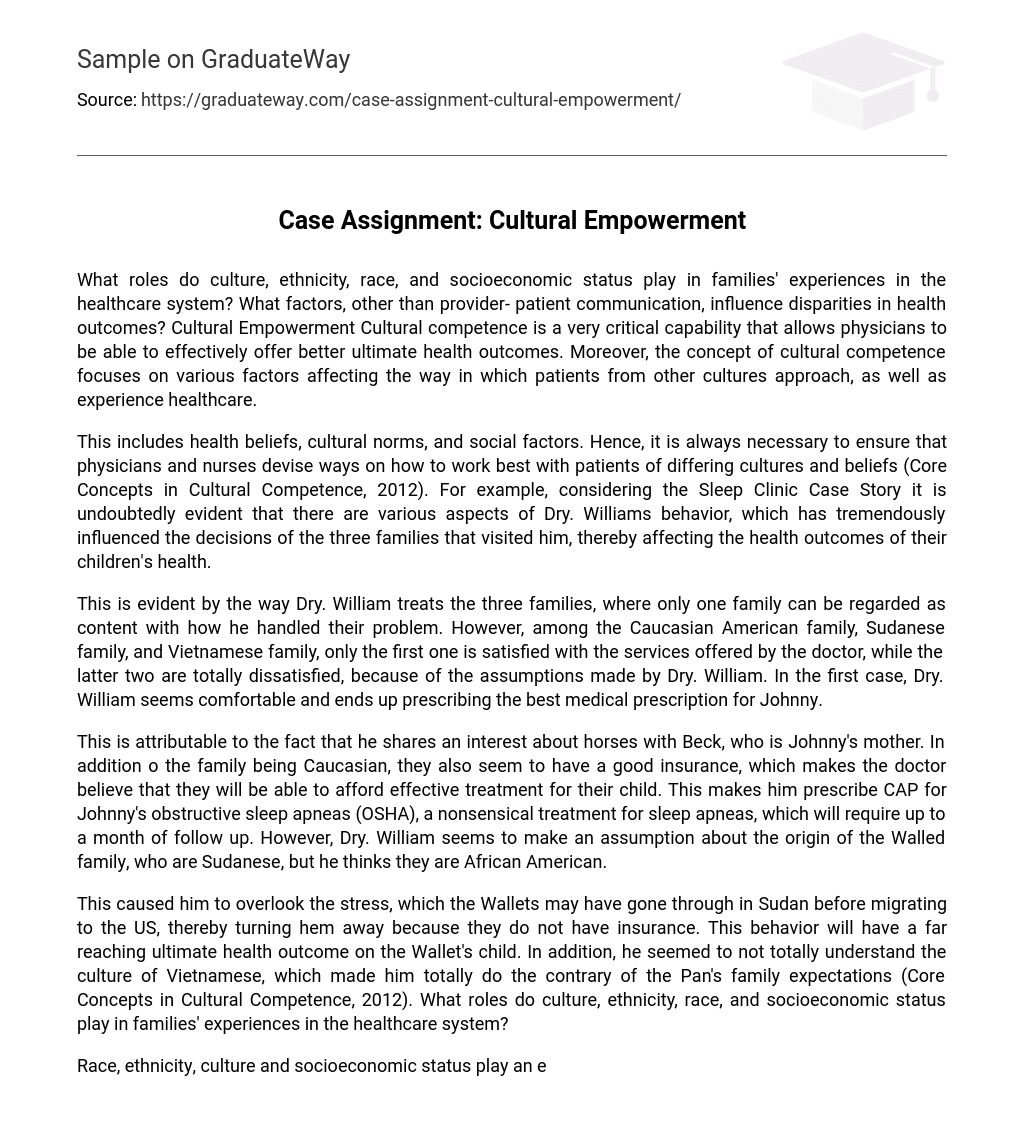What roles do culture, ethnicity, race, and socioeconomic status play in families’ experiences in the healthcare system? What factors, other than provider- patient communication, influence disparities in health outcomes?
Cultural competence is a very critical capability that allows physicians to be able to effectively offer better ultimate health outcomes. Moreover, the concept of cultural competence focuses on various factors affecting the way in which patients from other cultures approach, as well as experience healthcare.
This includes health beliefs, cultural norms, and social factors. Hence, it is always necessary to ensure that physicians and nurses devise ways on how to work best with patients of differing cultures and beliefs (Core Concepts in Cultural Competence, 2012). For example, considering the Sleep Clinic Case Story it is undoubtedly evident that there are various aspects of Dry. Williams behavior, which has tremendously influenced the decisions of the three families that visited him, thereby affecting the health outcomes of their children’s health.
This is evident by the way Dry. William treats the three families, where only one family can be regarded as content with how he handled their problem. However, among the Caucasian American family, Sudanese family, and Vietnamese family, only the first one is satisfied with the services offered by the doctor, while the latter two are totally dissatisfied, because of the assumptions made by Dry. William. In the first case, Dry. William seems comfortable and ends up prescribing the best medical prescription for Johnny.
This is attributable to the fact that he shares an interest about horses with Beck, who is Johnny’s mother. In addition o the family being Caucasian, they also seem to have a good insurance, which makes the doctor believe that they will be able to afford effective treatment for their child. This makes him prescribe CAP for Johnny’s obstructive sleep apneas (OSHA), a nonsensical treatment for sleep apneas, which will require up to a month of follow up. However, Dry. William seems to make an assumption about the origin of the Walled family, who are Sudanese, but he thinks they are African American.
This caused him to overlook the stress, which the Wallets may have gone through in Sudan before migrating to the US, thereby turning hem away because they do not have insurance. This behavior will have a far reaching ultimate health outcome on the Wallet’s child. In addition, he seemed to not totally understand the culture of Vietnamese, which made him totally do the contrary of the Pan’s family expectations (Core Concepts in Cultural Competence, 2012). What roles do culture, ethnicity, race, and socioeconomic status play in families’ experiences in the healthcare system?
Race, ethnicity, culture and socioeconomic status play an essential role in the healthcare system experiences among families. For instance, from the case study, it is evident that by the virtue of the Reese family being Caucasian Americans, they received the best experience in the Sleep Clinic. The other two families, the Sudanese and Vietnamese did not have the same experience as the Reese family. This is attributed to their difference in race, culture, ethnicity and socioeconomic status (Maternal Child Health Bureau, 2009).
The Caucasian American family is socioeconomics well off, which made them able to afford a good health insurance, hence a good experience with the healthcare system. The Walled ND Pan families are turned away because of the poor socioeconomic status and different culture respectively. What factors, other than provider-patient communication, influence disparities in health outcomes? Additionally, other than provider-patient communication, there are other factors that influence health outcomes disparities.
These factors include: cultural diversity, families’ health literacy, and the assumptions or perceptions/attitudes of the doctor (US Department of Health & Human Services, 2012). These factors are critical in influencing disparities in healthcare outcomes. This is mainly because they usually determine how the doctor perceives them, as well as whether they will be able to afford their medical bills by considering the health insurance they have, if not covered by Medicare or Medicaid.





